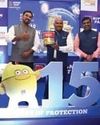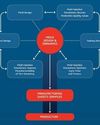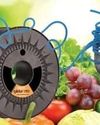With Increasing Populations, Volatile Market Conditions and Unsustainable Human Interventions, Today the World Is Helplessly Staring at Falling Food Supplies and Unsustainable Economic Models.

In 2016, the Government of India notified plastic packaging manufacturers and users about the new Plastic Waste Management Rules that would mandate use of recyclable, sustainable packaging material, extend the jurisdiction of recycling waste collection to rural areas, promote use of plastic waste in road construction, waste to energy or waste to fuel among other provisions.
This is a welcome move for a country that faces the challenge of handling 10,000 tonnes of plastic waste generated per day – while thermoplastic (inherently recyclable) waste forms 80 percent of this waste, the 20 percent of thermoset plastics, which include metalized and multilayered plastics and essentially all flexible food packaging of today, is the most visible and perceptibly problematic waste that municipal authorities deal with. Littered plastics are not just an eyesore – they practically choke cities, whether caught in drains, burnt or worse still, left unprocessed mixed with biodegradable waste.
While globally, governments and municipal authorities have tried multi-pronged approaches to increase recovery and recycling as well as reduce consumption and littering of flexible plastic waste, in India so far, we have not been able to achieve an optimal level of waste management. As per the CPCB report in 2015, 51.4 million tonnes of solid waste was generated in the country that year, of which 91 per cent was collected, 27 per cent was treated and remaining 73 per cent disposed of at dump sites. We still see a lot of plastic waste that remains littered, spoiling the view of landscape and raising concerns about India’s capability to achieve the objective of ‘Swachch Bharat’ promised by Prime Minister Modi.
While many solutions have been discussed on public forums on plastic waste management so far, I believe the answer for India would lie in the concept of Circular Economy.
Moving from linear to circular
この記事は ET Polymers の Aug - Sept 2017 版に掲載されています。
7 日間の Magzter GOLD 無料トライアルを開始して、何千もの厳選されたプレミアム ストーリー、9,000 以上の雑誌や新聞にアクセスしてください。
すでに購読者です ? サインイン
この記事は ET Polymers の Aug - Sept 2017 版に掲載されています。
7 日間の Magzter GOLD 無料トライアルを開始して、何千もの厳選されたプレミアム ストーリー、9,000 以上の雑誌や新聞にアクセスしてください。
すでに購読者です? サインイン

The Changing Face Of Mobility
A brief look at the salient points on how plastics is transforming automotive manufacturing

Nippon Launches Weatherbond PRO
Nippon Paint (India) Private Limited (Decorative Division) Asia’s leading paint manufacturer launched the advertising campaign for Weatherbond PRO – the high durable exterior emulsion offering up to 15 years of protection against extreme climate conditions like prolonged exposure to heat, and heavy spells of rain. Based on extensive research done by Nippon Paint’s R&D team, this product was developed for customers who need advance protection for their home exteriors in terms of extended fresh look, strong waterproofing and protection from Algal and Fungal attacks.

Low-Pressure Molding Adopted Across Industries
Henkel’s Technomelt Low-Pressure Molding technology meets demands for encapsulation of electronics and medical components

TotalEnergies and Jindal Films To introduce Certified Circular Polypropylene
TotalEnergies and Jindal Films have joined forces to produce more sustainable flexible food packaging and labels. Using advanced recycling technology from Plastic Energy, TotalEnergies will supply Jindal Films with Certified Circular Polypropylene produced from postconsumer plastic waste. This new value-chain collaboration will divert plastic waste currently destined for incineration and landfill because it is too complex to recycle through existing schemes.

Lenzing's VEOCEL™ Brand Launches Hydrophobic Lyocell Fibres With Dry Technology
In its quest to drive greater sustainability in the personal care and hygiene industry, the VEOCEL™ brand has launched a new offering: VEOCEL™ branded lyocell fibres with dry technology which are naturally smooth and gentle on skin, ensuring comfort for sensitive skin. Absorbent hygiene products are an indispensable part of many consumers’ lives and are relied upon daily. As these are essential items, it is important that they should offer maximum comfort and relief to the user. This is demonstrated by the new VEOCEL™ branded lyocell fibres which have the capacity to provide a high level of comfort, softness and dryness, when applied in these types of products.

Simulating Injection Molding for Efficiency
Producing high-quality, plastic injection-moulded parts more quickly and cost-effectively has become a critical factor for manufacturing success in today’s global market. Instead of engaging in slow, expensive prototype iterations and test cycles to satisfy manufacturing requirements, designers, mold makers, and manufacturing professionals can leverage SOLIDWORKS® Plastics mold-filling simulation software to optimise parts for manufacturability, refine tooling to improve quality and shorten cycle times to reduce manufacturing costs

Leveraging 3D Printing for optimised Injection Molds
A guideline from Formlabs on the factors to consider before using stereolithography (SLA) 3D printed molds in the injection molding process to lower costs, reduce lead times, and bring better products to market

iglidur I151 for FDA-compliant, Detectable, Wear Resistant Parts In Food Technology
igus has developed a blue, food-compatible tribo-filament for cost effective 3D printing of special parts. iglidur I151 is blue, prints easily, and has an optimal coefficient of friction and wear. The new tribo-filament is a refinement of the easy-to-machine igus iglidur I150 all-rounder filament. Because it is blue, it can be used to manufacture special parts that are optically detectable in the food industry. Food compatibility according to the FDA and to EU Regulation 10/2011 also qualifies the high-performance polymer for use in the food and cosmetics industries.

Exceptional Warpage Control
SABIC’s new LNP™ THERMOCOMP™ compounds deliver exceptional warpage control

Digital Transformation in Plastics
Automation in the plastics industry is becoming more complex, the pace of innovation is accelerating, and competitive pressure is increasing. Open and safe automation makes it possible to combine traditional mechanical engineering with the latest Industry 4.0 technologies – Lets take a look at how Industry 4.0 is transforming the plastics sector